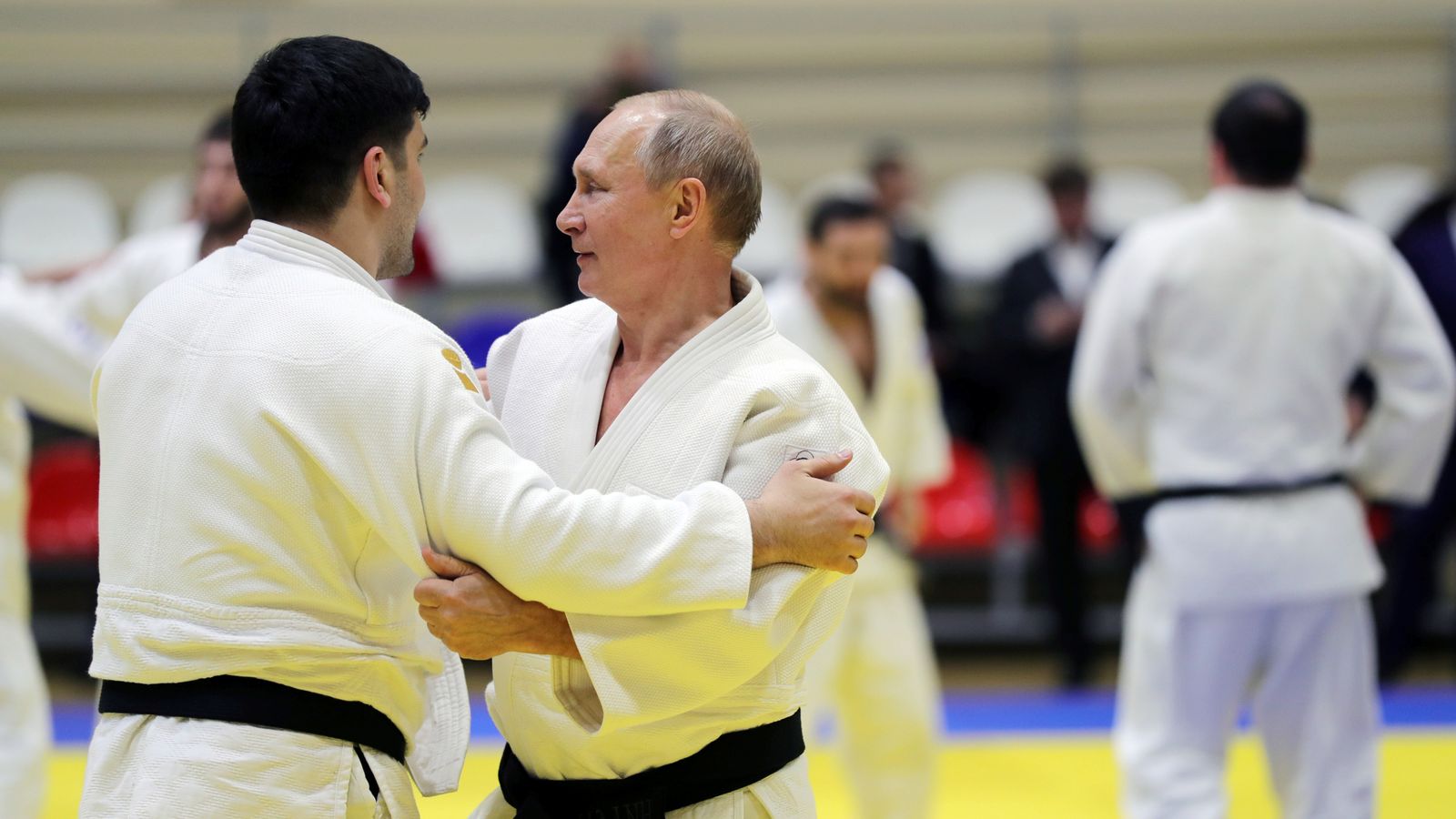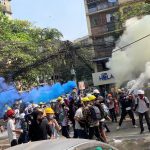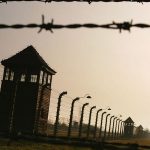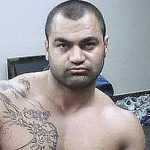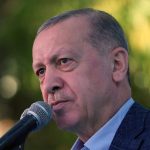Russian tanks spray up snow and mud as they churn through the rich black soil in the borderlands.
Moscow claims its forces are only taking part in military drills, but the message they deliver is that bloodshed may not be far away.
There is now a mass of armour sitting menacingly on Ukraine’s doorstep, the like of which has not been seen for many decades.
Since the end of the Cold War, it had seemed axiomatic to many here that peace is guaranteed in Europe.
But the spectre of parts of this continent tearing itself apart again is rising: and it’s breaking the logic that many had taken for granted.
In the Kremlin, Vladimir Putin, remains inscrutable, playing what may just as well be a psychological game of ‘Risk’ with his neighbours.
His intentions are unclear, but his goals are not.
Art attack: Russian painting vandalised by ‘bored’ security guard who drew eyes on it
Boris Johnson says next few days ‘most dangerous’ in Ukraine crisis as he calls on Putin to pull troops
Ukraine-Russia tensions: Vladimir Putin warned by Ukrainian general his troops will ‘fight until the very last breath’
The former KGB man wants to resurrect the imperium and glory of the Soviet Union, in part at least.
Its collapse was for him, and by extension the Russia he rules like a modern day Czar, a “geopolitical tragedy”, which he now seems hellbent on correcting.
Please use Chrome browser for a more accessible video player
The Ukrainian ambassador to the UK, Vadym Prystaiko, likens Putin to a racketeer threatening you and then offering protection.
He is both arsonist and firefighter; match and water.
What’s his plan?
In that analogy, this is how the shakedown of the West works.
Tactically moving 130,000 troops to the border forces a place at the negotiating table where Russia can then attempt to impose a new strategic vision for Europe’s collective security.
In this reality, the ‘Great Bear’ believes it restores some of the sphere of influence it lost in 1991 – Ukraine is a jewel it thinks must return to the gravity of ‘Mother Russia’.
Europe literally has a gun to its head, as it is strongly persuaded into establishing a post-Soviet new order.
Moscow then promises it will de-escalate the immediate crisis it manufactured, if it gets the guarantees it wants wrapped up in a new Yalta-style grand bargain – the conference which saw Europe carved up at the end of the Second World War.
Please use Chrome browser for a more accessible video player
In such a scenario, Ukrainian sovereignty doesn’t exist, just the desires of its large neighbour next door.
Much is made of Putin as a master strategist.
But the strong-arming he is doing now, will only be successful if the West believes he will act.
Remember, if he does invade he can no longer negotiate over the promise of not invading.
So, is this just a con trick, or something else?
‘Is your opponent crazy enough?’
Russia has acted before over its fears about NATO – in Georgia in 2008 and in Crimea in 2014.
But a full-scale invasion of Ukraine would be of a different order of magnitude.
It is also interesting that in this crisis, Putin has referred twice in recent days to nuclear weapons; the archetype of coercive diplomacy.
These utterances are important as they shine a bright and bold light on where Russia’s tactics currently lie.
It is doing everything in its power, short of hot war, to get what it wants.
Thomas Schelling, a Nobel prize winner in Economics, compared nuclear weapons – when used as a bargaining tool – to a game of chicken.
If you think your opponent is crazy enough to use them, then you are more likely to back down.
Putin has no end of military advisers, who will be telling him just this – as a ploy it has a lineage in Russian military doctrine dating back to the great theorist General Vasily Sokolovsky.
Please use Chrome browser for a more accessible video player
In his most famous work, Military Strategy, he writes extensively about nuclear warfare with a heavy emphasis on pre-emptive strikes.
Crucially though, this tome was produced for a domestic and international audience, perhaps with the aim of rattling the West.
Actual Soviet nuclear policy dating back to the Brezhnev era has been far more realistic, built around the idea of deterrence, not first strike and victory.
Read: Boris Johnson tells Russia that NATO will ‘draw lines in the snow’ over Ukraine crisis
And under Putin, arguably, there’s been no change in that strategic thinking in the real world.
The difference is that he grasps in sophisticated ways how a military machine, every sinew, or even just the idea of it, can be leveraged to fight wars in the 21st century without a shot being fired.
As a judo master, he also understands how such tactics can be deployed to catch the enemy off balance and keep them there – and with the West it appears to be working.
Calling his bluff
The strongman image Putin has cultivated over the years is one of his best weapons.
The denied attacks with chemical weapons on foreign soil for instance, create the illusion of someone who might just be mad enough to press the button, or send columns of armour across an internationally recognised border.
The truth is a war in Ukraine would cost Russia dearly and perhaps Vladimir Putin personally.
He, as a keen student, will be more than aware that Russian history is littered with revolutions which happened soon after seismic events abroad.
Read: Commander of Ukraine troops says they will ‘fight until the very last breath’
For the moment though the master in the Kremlin is counting on the West not calling his bluff.
That does not mean a war won’t come.
Accidents, misunderstandings and miscalculation – the contingency of conflict – could usher in something dark and terrible, as they did on that summer’s day in Sarajevo on 28 June 1914.
But for the moment, what the world is witnessing is a negotiation with the threat of brute force by a thuggish regime.
The question is who will blink first?
